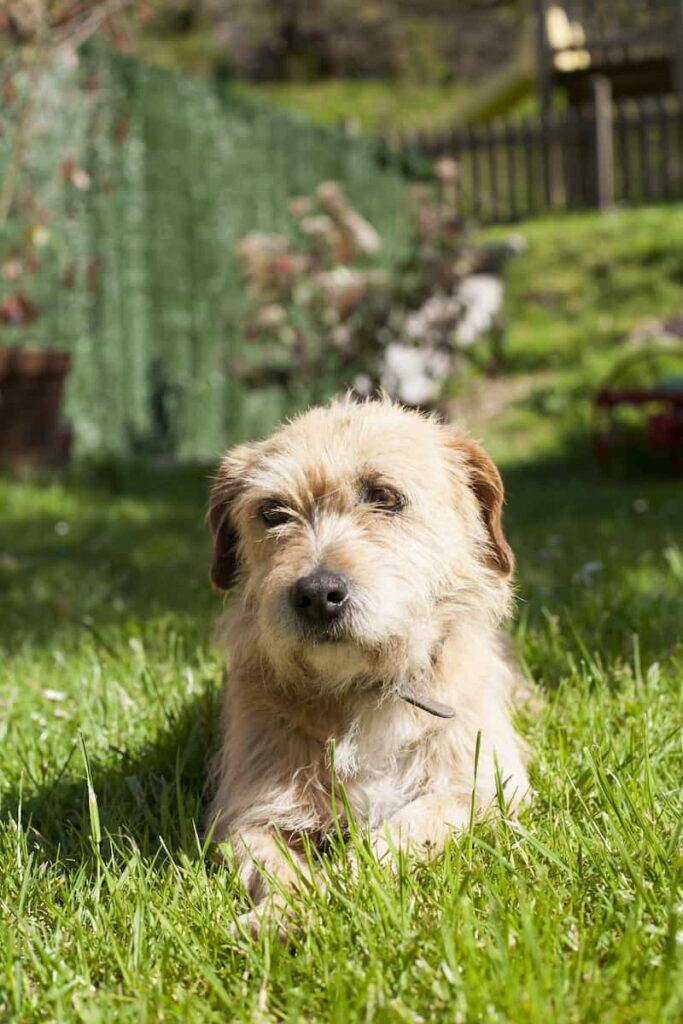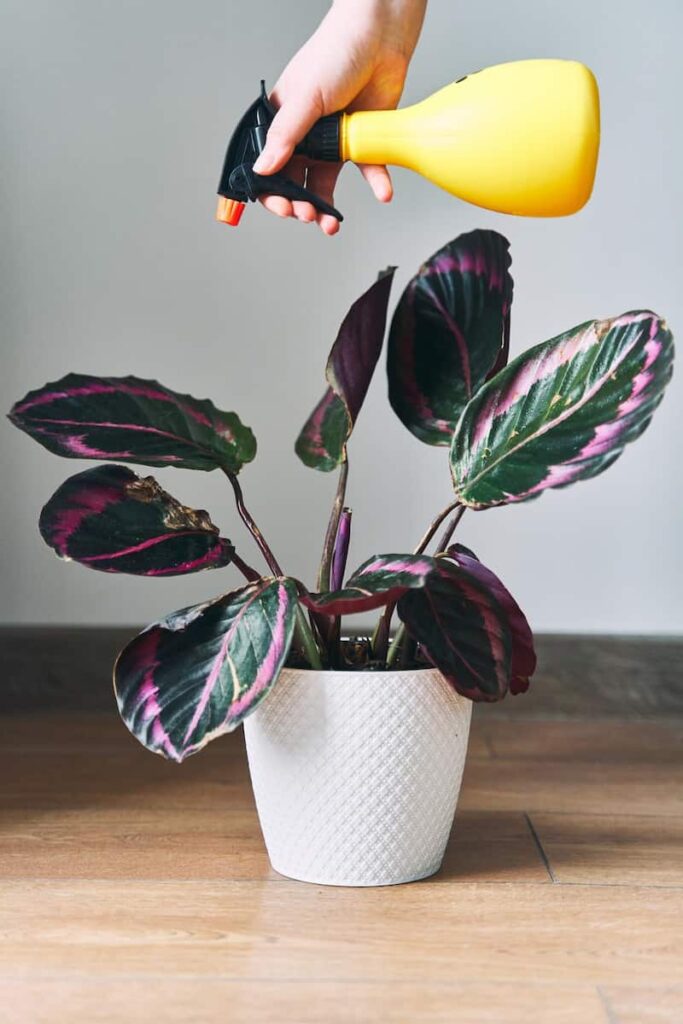Houseplants, such as Calathea, can add interest and improve the aesthetic of any room. If, however, you share your home with pets, growing plants indoors may pose a serious risk to their health.
Many of the most popular houseplants are actually toxic to cats, dogs, and even humans! Because of this, it’s best to research any plant before you bring it into your home.
Let’s take a look at whether or not Calathea is toxic to cats, dogs, or humans, and what risks the plant could potentially have if consumed.

Table of Contents
Is calathea toxic to cats?
According to the ASPCA, the calathea is not toxic to cats, dogs, or horses. This means you can safely grow these plants in homes with cats. In fact, all cultures in the Calathea genus are safe and non-toxic to cats.
This makes the Calathea a good choice for homes with cats. Keep in mind, however, that since the plant is not a part of the cat’s regular diet, allowing them to eat too much of the Calathea can cause stomach upset.
Thankfully, this is usually not a serious problem, nor does it cause any lasting side effects.
What happens if a cat eats a calathea?
Since the Calathea isn’t toxic, consuming a small amount of the plant should cause any adverse side effects for your cat. However, if your feline eats a large amount of the Calathea, it could potentially cause gastrointestinal distress, such as vomiting, diarrhea, and stomach pain.
Thankfully, these symptoms are usually not life threatening and will subside within 24 hours.
One potentially serious complication that could occur, however, is dehydration. This is especially a concern if your cat has been vomiting and having diarrhea for more than a few hours.
Dehydration is especially concerning for cats, since they sometimes experience bouts of dehydration even when they are not sick.
FYI: If your cat is experiencing symptoms for more than 24 hours or they are showing signs of dehydration, such as weakness, lethargy, dry mucous membranes, or white gums, immediately seek medical attention for your pet.
Why is calathea cat-friendly?
Yes, Calatheas are an extremely cat-friendly houseplant, given that they are non-toxic to cats and dogs. So, if your cat happens to nibble on the plant, it won’t put their health at risk. They also produce stunning and unique foliage that closes at night.
Calatheas are a wonderful choice for homes with pets since they are safe even if your cat or dog ingests any portion of the plant. They’re also an interesting houseplant to grow as, in line with their other name as “prayer plants”, Calatheas leaves pointing up at night.
Additionally, Calatheas are not difficult to grow and require about the same type of care as other tropical houseplants.
This means warm temperatures, bright indirect light, watering when the soil is dry, and humidity levels of at least 50 percent. They are also not susceptible to many diseases.
Is calathea toxic to dogs?
Calatheas are not toxic to dogs, which means you can grow these houseplants in dog-friendly homes and not have to worry about the plant harming your pooch’s health. That said, even though this plant isn’t toxic, it can still cause some unpleasant side effects for your pooch.
This means that you should still try to deter your dog from consuming the Calathea plant. Additionally, letting them eat the Calathea damages the plant itself.
Instead of just allowing your dogs to eat the plant, give them toys and other items designed for canines. This helps to train them not to consume houseplants, which will come in handy if you ever bring a plant indoors that could pose a risk to their health.

What happens if a dog eats a calathea?
In most cases, your dog won’t have any adverse side effects if they eat the Calathea. However, if they consume large quantities of the plant, it could potentially cause gastrointestinal side effects, including vomiting and diarrhea. Thankfully, these side effects are not typically life threatening and last about 24 hours.
Even though Calathea isn’t toxic, consuming the plant can cause an upset stomach. While this is usually just a small bout, vomiting and diarrhea can lead to dehydration if it continues for an extended period of time.
If, however, your dog continues to experience symptoms for over 24 hours, or the symptoms are more severe, immediately seek veterinary attention.
Alternatively, you can call poison control and they can assist as to whether or not the issue warrants a trip to the emergency vet.
Are all calathea safe for pets?
All plants in the Calathea genus are safe for pets. However, there can be a little confusion because, at one point, the Calathea genus had over 200 species associated with this plant. That has since changed and many of the plants were moved to a different genus.
In recent years, many of the plants once considered a member of the Calathea genus have been assigned to a different genus, known as Geoppertia. This has greatly shrunk the Calathea genus, and there are now only about 60 species left in this genus.
All plants in the Calathea genus are non-toxic to cats, dogs, and humans. This includes all parts of the plant, such as the leaves, stems, roots, and flowers. Consuming too much of the plant, however, can cause an upset stomach, so just keep that in mind.

Is calathea toxic to humans?
Calatheas are not toxic to humans, which makes them a good choice for homes with little children. Keep in mind, however, that even though Calathea is non-toxic, it can still cause stomach upsets in humans when consumed. In most cases, however, these symptoms won’t last longer than 24 hours.
While you may not think about taking a bit out of your houseplants, toddlers and young children like to put things in their mouths. And having non-toxic houseplants will help protect your children from harm.
Fortunately, even if they do somehow consume enough to get an upset stomach, this is usually going to be more of an annoyance than a serious problem.
Take note: If the symptoms persist or are more severe, medical attention may be required. If you’re concerned about the amount ingested but aren’t quite sure if it warrants a trip to the ER, consider calling poison control.
They can assist with the amount that was ingested with yours or the child’s body weight and determine if it constitutes a trip to the emergency room.
How do I stop my cat from eating calathea?
Whether or not Calathea is toxic or not, doesn’t mean you should allow your cat to munch on the plant whenever it wants, as this will damage its attractive foliage. Letting your kitty feast on the Calathea can actually kill the plant. That is why you should stop your cat from eating the Calathea.
1. Redirect their attention away from the calathea
One of the best ways to stop your cat from eating the Calathea plant is to redirect their attention away from the plant and to something else, such as a toy.
When your kitty is sniffing, chewing, or bothering the Calathea, take out their favorite toy and start playing with them. In most cases, your cat is messing with the plant because they are bored.
If you can redirect their attention away from the Calathea, they will eventually leave the plant alone.
2. Apply a repellent spray to the calathea
There are commercially available repellent sprays designed to keep cats and dogs away from houseplants. These sprays typically contain ingredients that cats don’t like, such as citrus, and are safe for both the animal and the houseplant.
When applied, the repellent coats the plant in the substance that cats and dogs find unappealing. Then, when they try to nibble on the plant, they get an unpleasant taste in their mouths.

3. Keep the calathea in an area away from your cat
One of the easiest ways to keep your cat from bothering the Calathea is to simply keep the plant in an area that is out of reach from your cat.
This could be in a different room where the cat is not allowed to go, or up on a tall bookshelf where the cat cannot reach it.
4. Give your cat their own plants
Consider providing cat friendly plants, such as cat grass, for your cat to nibble on. Cat grass is designed for cats to consume and it can take care of any desire your kitty may have to eat plants.
What’s even better is that cat grass is easy to grow, grows fast, and is safe for cats and dogs.
5. Use heavy pebbles to deter diggers
Chewing on the Calathea isn’t the only way cats can damage the plant. They can also cause havoc by digging. If your cat likes to dig in the dirt of your houseplants, try adding some heavy pebbles to the top of the soil.
Heavy pebbles placed on the top of the soil helps to cover the dirt and prevents your cat from digging. The pebbles can also make the top of the soil look more esthetically pleasing and won’t harm your pets.

6. Lightly mist your cat with water when they bother the calathea
Most cat experts recommend not spraying your cat with a water bottle since this can lead to trust issues with your feline friend. However, there are still some that believe in this method of correcting.
If you do choose to use this method of correcting, make sure you are only using water in a clean spray bottle. Whenever your cat is bothering the Calathea, tell them “NO” in a stern voice and then lightly squirt them with the water.
